PPMP20009 Project Management Methodologies: Portfolio Term 1, 2018
VerifiedAdded on 2023/06/11
|83
|15224
|176
Portfolio
AI Summary
This consolidated portfolio reflects on the learning outcomes of the Project Management Methodologies course (PPMP20009). It discusses the reasons organizations adopt project management methodologies, analyzes their impact on stakeholders, and justifies the major elements that meet organizational needs. The portfolio includes weekly reflections, practical experiences, and supporting documents, demonstrating an understanding of project planning, stakeholder management, and the importance of selecting appropriate methodologies for successful project execution. The student's experience as an intern in a software manufacturing company, where agile project methodology was used, is also highlighted.
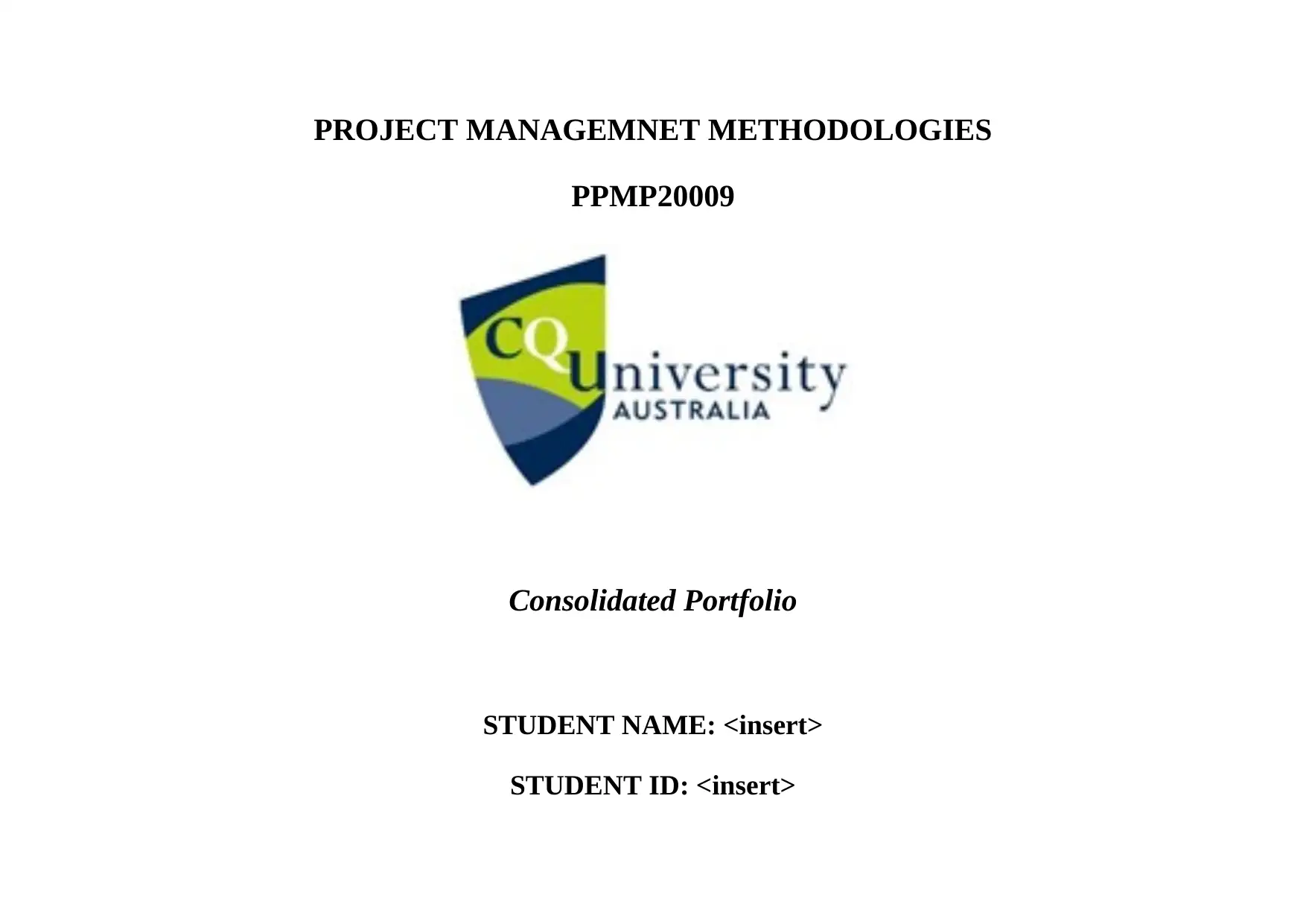
PROJECT MANAGEMNET METHODOLOGIES
PPMP20009
Consolidated Portfolio
STUDENT NAME: <insert>
STUDENT ID: <insert>
PPMP20009
Consolidated Portfolio
STUDENT NAME: <insert>
STUDENT ID: <insert>
Paraphrase This Document
Need a fresh take? Get an instant paraphrase of this document with our AI Paraphraser

LECTURER:<insert>
CAMPUS: <insert>
TERM: 1, 2018
CAMPUS: <insert>
TERM: 1, 2018
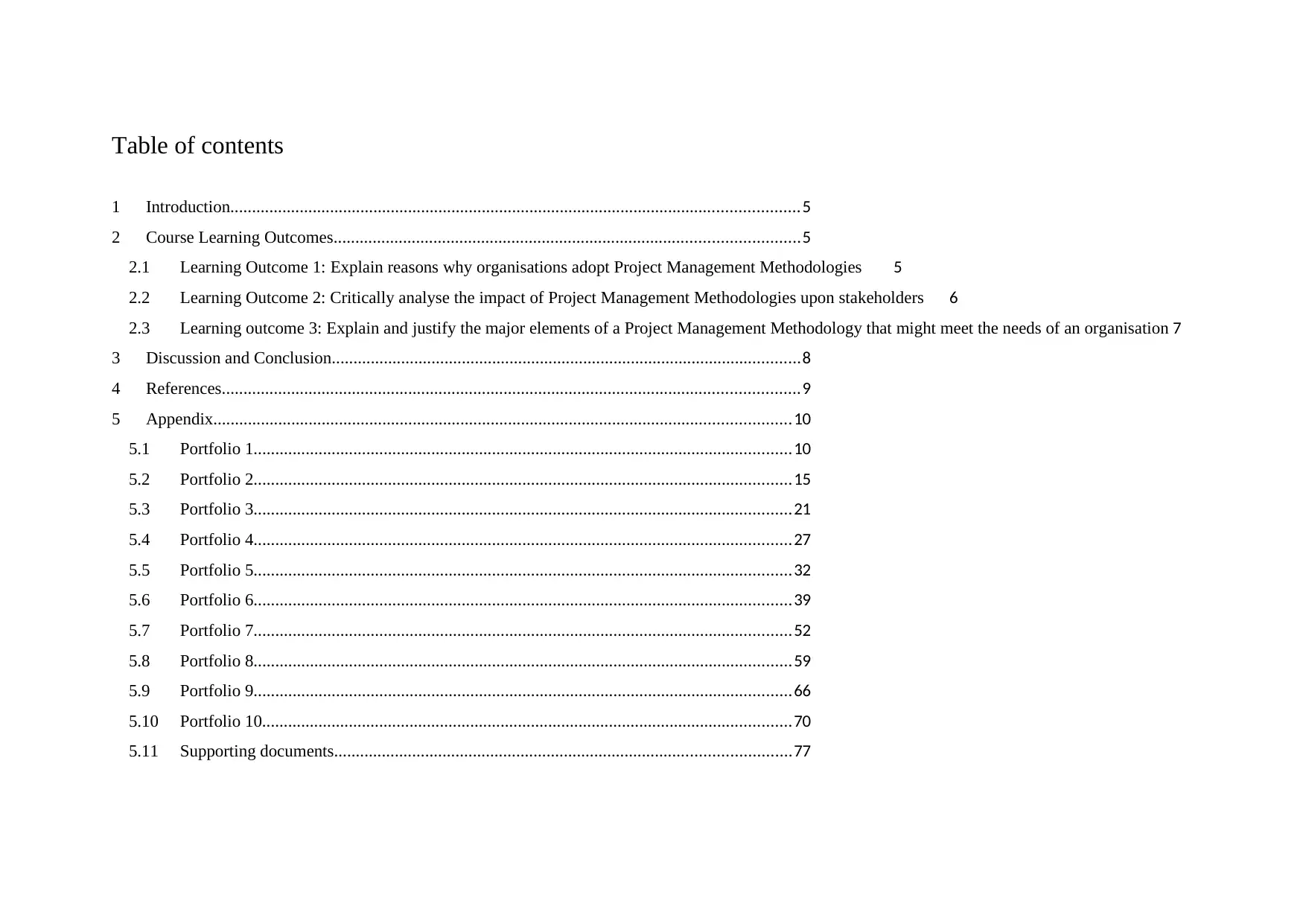
Table of contents
1 Introduction...................................................................................................................................5
2 Course Learning Outcomes...........................................................................................................5
2.1 Learning Outcome 1: Explain reasons why organisations adopt Project Management Methodologies 5
2.2 Learning Outcome 2: Critically analyse the impact of Project Management Methodologies upon stakeholders 6
2.3 Learning outcome 3: Explain and justify the major elements of a Project Management Methodology that might meet the needs of an organisation 7
3 Discussion and Conclusion............................................................................................................8
4 References.....................................................................................................................................9
5 Appendix.....................................................................................................................................10
5.1 Portfolio 1............................................................................................................................10
5.2 Portfolio 2............................................................................................................................15
5.3 Portfolio 3............................................................................................................................21
5.4 Portfolio 4............................................................................................................................27
5.5 Portfolio 5............................................................................................................................32
5.6 Portfolio 6............................................................................................................................39
5.7 Portfolio 7............................................................................................................................52
5.8 Portfolio 8............................................................................................................................59
5.9 Portfolio 9............................................................................................................................66
5.10 Portfolio 10..........................................................................................................................70
5.11 Supporting documents.........................................................................................................77
1 Introduction...................................................................................................................................5
2 Course Learning Outcomes...........................................................................................................5
2.1 Learning Outcome 1: Explain reasons why organisations adopt Project Management Methodologies 5
2.2 Learning Outcome 2: Critically analyse the impact of Project Management Methodologies upon stakeholders 6
2.3 Learning outcome 3: Explain and justify the major elements of a Project Management Methodology that might meet the needs of an organisation 7
3 Discussion and Conclusion............................................................................................................8
4 References.....................................................................................................................................9
5 Appendix.....................................................................................................................................10
5.1 Portfolio 1............................................................................................................................10
5.2 Portfolio 2............................................................................................................................15
5.3 Portfolio 3............................................................................................................................21
5.4 Portfolio 4............................................................................................................................27
5.5 Portfolio 5............................................................................................................................32
5.6 Portfolio 6............................................................................................................................39
5.7 Portfolio 7............................................................................................................................52
5.8 Portfolio 8............................................................................................................................59
5.9 Portfolio 9............................................................................................................................66
5.10 Portfolio 10..........................................................................................................................70
5.11 Supporting documents.........................................................................................................77
⊘ This is a preview!⊘
Do you want full access?
Subscribe today to unlock all pages.

Trusted by 1+ million students worldwide

Paraphrase This Document
Need a fresh take? Get an instant paraphrase of this document with our AI Paraphraser
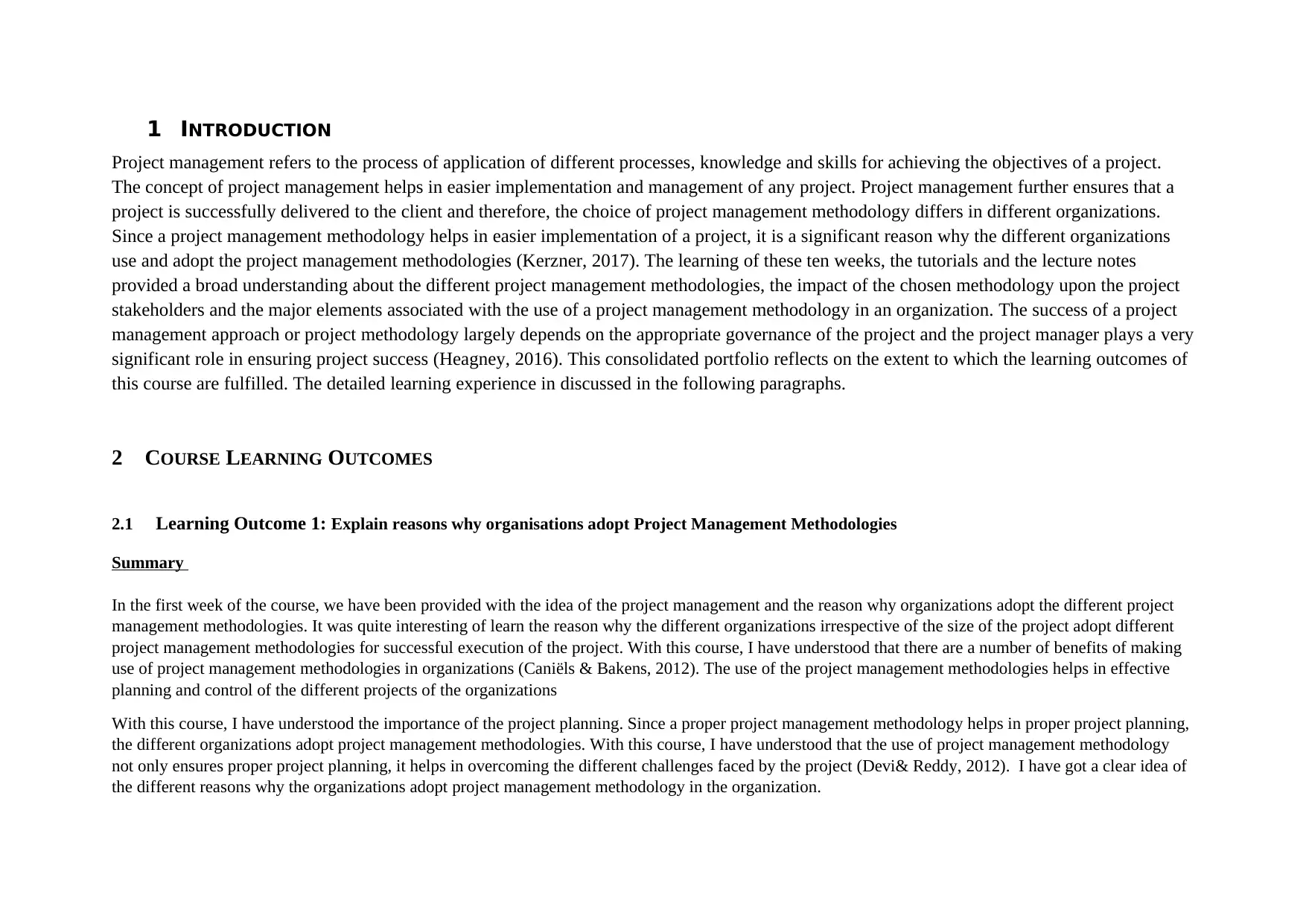
1 INTRODUCTION
Project management refers to the process of application of different processes, knowledge and skills for achieving the objectives of a project.
The concept of project management helps in easier implementation and management of any project. Project management further ensures that a
project is successfully delivered to the client and therefore, the choice of project management methodology differs in different organizations.
Since a project management methodology helps in easier implementation of a project, it is a significant reason why the different organizations
use and adopt the project management methodologies (Kerzner, 2017). The learning of these ten weeks, the tutorials and the lecture notes
provided a broad understanding about the different project management methodologies, the impact of the chosen methodology upon the project
stakeholders and the major elements associated with the use of a project management methodology in an organization. The success of a project
management approach or project methodology largely depends on the appropriate governance of the project and the project manager plays a very
significant role in ensuring project success (Heagney, 2016). This consolidated portfolio reflects on the extent to which the learning outcomes of
this course are fulfilled. The detailed learning experience in discussed in the following paragraphs.
2 COURSE LEARNING OUTCOMES
2.1 Learning Outcome 1: Explain reasons why organisations adopt Project Management Methodologies
Summary
In the first week of the course, we have been provided with the idea of the project management and the reason why organizations adopt the different project
management methodologies. It was quite interesting of learn the reason why the different organizations irrespective of the size of the project adopt different
project management methodologies for successful execution of the project. With this course, I have understood that there are a number of benefits of making
use of project management methodologies in organizations (Caniëls & Bakens, 2012). The use of the project management methodologies helps in effective
planning and control of the different projects of the organizations
With this course, I have understood the importance of the project planning. Since a proper project management methodology helps in proper project planning,
the different organizations adopt project management methodologies. With this course, I have understood that the use of project management methodology
not only ensures proper project planning, it helps in overcoming the different challenges faced by the project (Devi& Reddy, 2012). I have got a clear idea of
the different reasons why the organizations adopt project management methodology in the organization.
Project management refers to the process of application of different processes, knowledge and skills for achieving the objectives of a project.
The concept of project management helps in easier implementation and management of any project. Project management further ensures that a
project is successfully delivered to the client and therefore, the choice of project management methodology differs in different organizations.
Since a project management methodology helps in easier implementation of a project, it is a significant reason why the different organizations
use and adopt the project management methodologies (Kerzner, 2017). The learning of these ten weeks, the tutorials and the lecture notes
provided a broad understanding about the different project management methodologies, the impact of the chosen methodology upon the project
stakeholders and the major elements associated with the use of a project management methodology in an organization. The success of a project
management approach or project methodology largely depends on the appropriate governance of the project and the project manager plays a very
significant role in ensuring project success (Heagney, 2016). This consolidated portfolio reflects on the extent to which the learning outcomes of
this course are fulfilled. The detailed learning experience in discussed in the following paragraphs.
2 COURSE LEARNING OUTCOMES
2.1 Learning Outcome 1: Explain reasons why organisations adopt Project Management Methodologies
Summary
In the first week of the course, we have been provided with the idea of the project management and the reason why organizations adopt the different project
management methodologies. It was quite interesting of learn the reason why the different organizations irrespective of the size of the project adopt different
project management methodologies for successful execution of the project. With this course, I have understood that there are a number of benefits of making
use of project management methodologies in organizations (Caniëls & Bakens, 2012). The use of the project management methodologies helps in effective
planning and control of the different projects of the organizations
With this course, I have understood the importance of the project planning. Since a proper project management methodology helps in proper project planning,
the different organizations adopt project management methodologies. With this course, I have understood that the use of project management methodology
not only ensures proper project planning, it helps in overcoming the different challenges faced by the project (Devi& Reddy, 2012). I have got a clear idea of
the different reasons why the organizations adopt project management methodology in the organization.
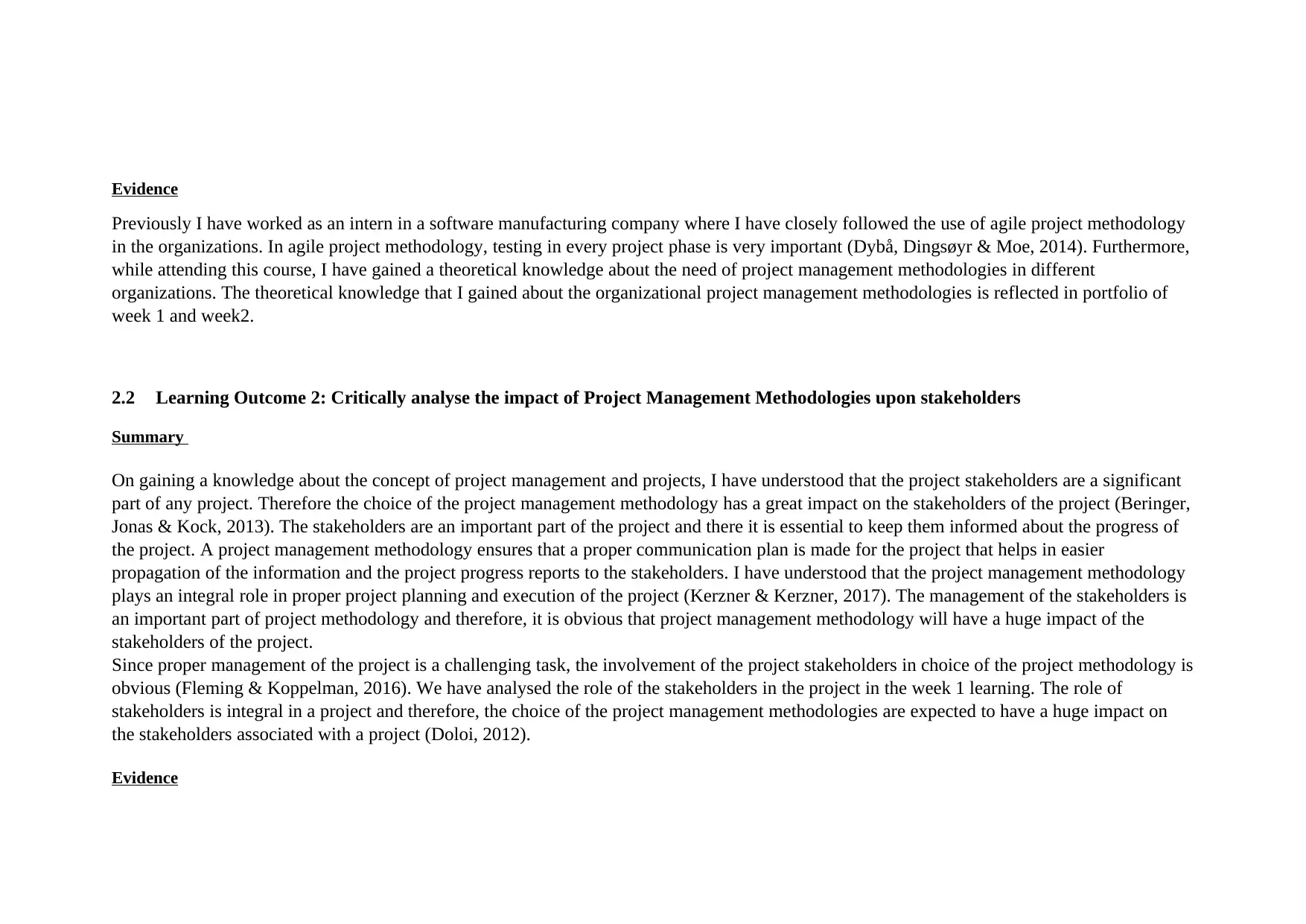
Evidence
Previously I have worked as an intern in a software manufacturing company where I have closely followed the use of agile project methodology
in the organizations. In agile project methodology, testing in every project phase is very important (Dybå, Dingsøyr & Moe, 2014). Furthermore,
while attending this course, I have gained a theoretical knowledge about the need of project management methodologies in different
organizations. The theoretical knowledge that I gained about the organizational project management methodologies is reflected in portfolio of
week 1 and week2.
2.2 Learning Outcome 2: Critically analyse the impact of Project Management Methodologies upon stakeholders
Summary
On gaining a knowledge about the concept of project management and projects, I have understood that the project stakeholders are a significant
part of any project. Therefore the choice of the project management methodology has a great impact on the stakeholders of the project (Beringer,
Jonas & Kock, 2013). The stakeholders are an important part of the project and there it is essential to keep them informed about the progress of
the project. A project management methodology ensures that a proper communication plan is made for the project that helps in easier
propagation of the information and the project progress reports to the stakeholders. I have understood that the project management methodology
plays an integral role in proper project planning and execution of the project (Kerzner & Kerzner, 2017). The management of the stakeholders is
an important part of project methodology and therefore, it is obvious that project management methodology will have a huge impact of the
stakeholders of the project.
Since proper management of the project is a challenging task, the involvement of the project stakeholders in choice of the project methodology is
obvious (Fleming & Koppelman, 2016). We have analysed the role of the stakeholders in the project in the week 1 learning. The role of
stakeholders is integral in a project and therefore, the choice of the project management methodologies are expected to have a huge impact on
the stakeholders associated with a project (Doloi, 2012).
Evidence
Previously I have worked as an intern in a software manufacturing company where I have closely followed the use of agile project methodology
in the organizations. In agile project methodology, testing in every project phase is very important (Dybå, Dingsøyr & Moe, 2014). Furthermore,
while attending this course, I have gained a theoretical knowledge about the need of project management methodologies in different
organizations. The theoretical knowledge that I gained about the organizational project management methodologies is reflected in portfolio of
week 1 and week2.
2.2 Learning Outcome 2: Critically analyse the impact of Project Management Methodologies upon stakeholders
Summary
On gaining a knowledge about the concept of project management and projects, I have understood that the project stakeholders are a significant
part of any project. Therefore the choice of the project management methodology has a great impact on the stakeholders of the project (Beringer,
Jonas & Kock, 2013). The stakeholders are an important part of the project and there it is essential to keep them informed about the progress of
the project. A project management methodology ensures that a proper communication plan is made for the project that helps in easier
propagation of the information and the project progress reports to the stakeholders. I have understood that the project management methodology
plays an integral role in proper project planning and execution of the project (Kerzner & Kerzner, 2017). The management of the stakeholders is
an important part of project methodology and therefore, it is obvious that project management methodology will have a huge impact of the
stakeholders of the project.
Since proper management of the project is a challenging task, the involvement of the project stakeholders in choice of the project methodology is
obvious (Fleming & Koppelman, 2016). We have analysed the role of the stakeholders in the project in the week 1 learning. The role of
stakeholders is integral in a project and therefore, the choice of the project management methodologies are expected to have a huge impact on
the stakeholders associated with a project (Doloi, 2012).
Evidence
⊘ This is a preview!⊘
Do you want full access?
Subscribe today to unlock all pages.

Trusted by 1+ million students worldwide
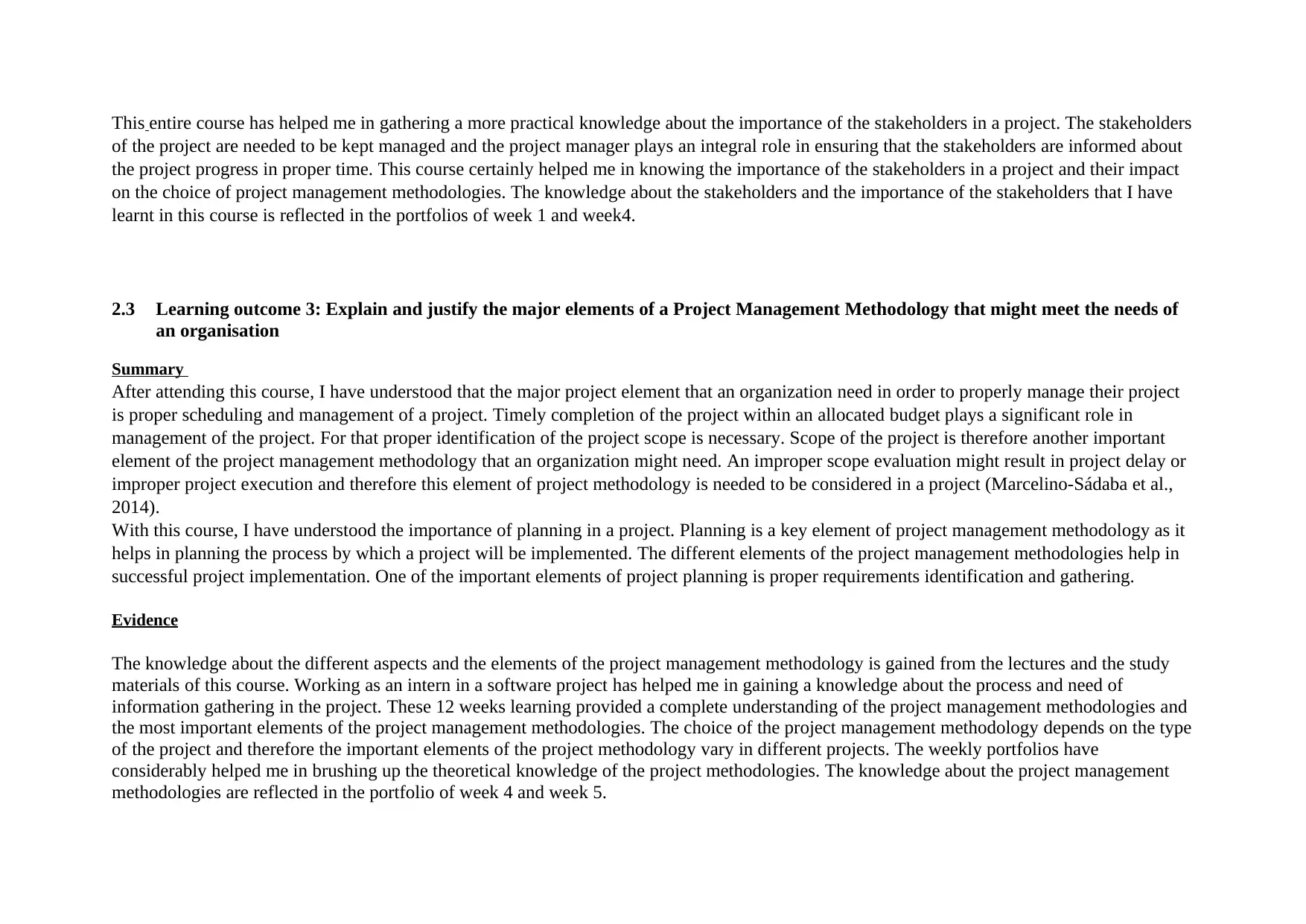
This entire course has helped me in gathering a more practical knowledge about the importance of the stakeholders in a project. The stakeholders
of the project are needed to be kept managed and the project manager plays an integral role in ensuring that the stakeholders are informed about
the project progress in proper time. This course certainly helped me in knowing the importance of the stakeholders in a project and their impact
on the choice of project management methodologies. The knowledge about the stakeholders and the importance of the stakeholders that I have
learnt in this course is reflected in the portfolios of week 1 and week4.
2.3 Learning outcome 3: Explain and justify the major elements of a Project Management Methodology that might meet the needs of
an organisation
Summary
After attending this course, I have understood that the major project element that an organization need in order to properly manage their project
is proper scheduling and management of a project. Timely completion of the project within an allocated budget plays a significant role in
management of the project. For that proper identification of the project scope is necessary. Scope of the project is therefore another important
element of the project management methodology that an organization might need. An improper scope evaluation might result in project delay or
improper project execution and therefore this element of project methodology is needed to be considered in a project (Marcelino-Sádaba et al.,
2014).
With this course, I have understood the importance of planning in a project. Planning is a key element of project management methodology as it
helps in planning the process by which a project will be implemented. The different elements of the project management methodologies help in
successful project implementation. One of the important elements of project planning is proper requirements identification and gathering.
Evidence
The knowledge about the different aspects and the elements of the project management methodology is gained from the lectures and the study
materials of this course. Working as an intern in a software project has helped me in gaining a knowledge about the process and need of
information gathering in the project. These 12 weeks learning provided a complete understanding of the project management methodologies and
the most important elements of the project management methodologies. The choice of the project management methodology depends on the type
of the project and therefore the important elements of the project methodology vary in different projects. The weekly portfolios have
considerably helped me in brushing up the theoretical knowledge of the project methodologies. The knowledge about the project management
methodologies are reflected in the portfolio of week 4 and week 5.
of the project are needed to be kept managed and the project manager plays an integral role in ensuring that the stakeholders are informed about
the project progress in proper time. This course certainly helped me in knowing the importance of the stakeholders in a project and their impact
on the choice of project management methodologies. The knowledge about the stakeholders and the importance of the stakeholders that I have
learnt in this course is reflected in the portfolios of week 1 and week4.
2.3 Learning outcome 3: Explain and justify the major elements of a Project Management Methodology that might meet the needs of
an organisation
Summary
After attending this course, I have understood that the major project element that an organization need in order to properly manage their project
is proper scheduling and management of a project. Timely completion of the project within an allocated budget plays a significant role in
management of the project. For that proper identification of the project scope is necessary. Scope of the project is therefore another important
element of the project management methodology that an organization might need. An improper scope evaluation might result in project delay or
improper project execution and therefore this element of project methodology is needed to be considered in a project (Marcelino-Sádaba et al.,
2014).
With this course, I have understood the importance of planning in a project. Planning is a key element of project management methodology as it
helps in planning the process by which a project will be implemented. The different elements of the project management methodologies help in
successful project implementation. One of the important elements of project planning is proper requirements identification and gathering.
Evidence
The knowledge about the different aspects and the elements of the project management methodology is gained from the lectures and the study
materials of this course. Working as an intern in a software project has helped me in gaining a knowledge about the process and need of
information gathering in the project. These 12 weeks learning provided a complete understanding of the project management methodologies and
the most important elements of the project management methodologies. The choice of the project management methodology depends on the type
of the project and therefore the important elements of the project methodology vary in different projects. The weekly portfolios have
considerably helped me in brushing up the theoretical knowledge of the project methodologies. The knowledge about the project management
methodologies are reflected in the portfolio of week 4 and week 5.
Paraphrase This Document
Need a fresh take? Get an instant paraphrase of this document with our AI Paraphraser
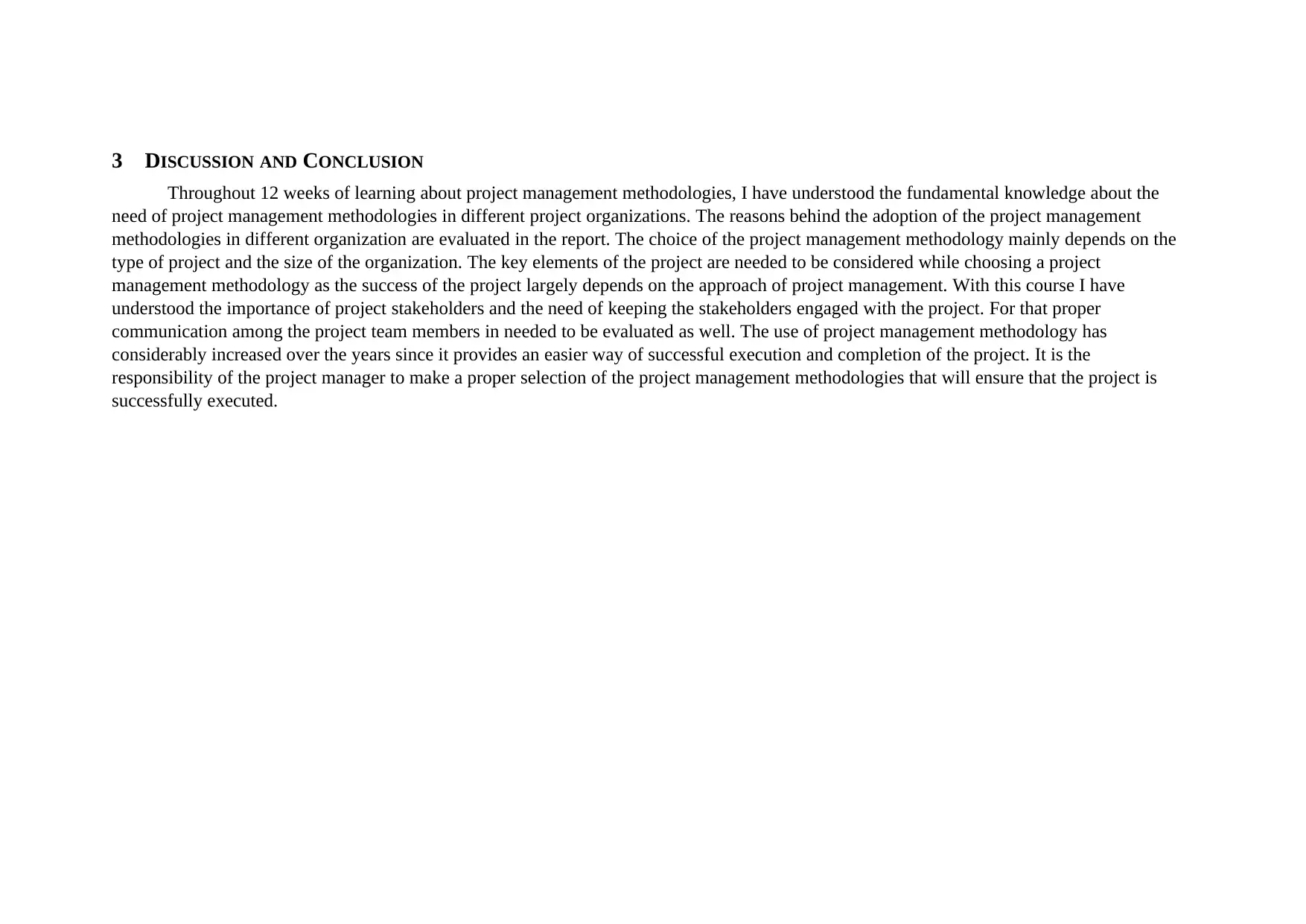
3 DISCUSSION AND CONCLUSION
Throughout 12 weeks of learning about project management methodologies, I have understood the fundamental knowledge about the
need of project management methodologies in different project organizations. The reasons behind the adoption of the project management
methodologies in different organization are evaluated in the report. The choice of the project management methodology mainly depends on the
type of project and the size of the organization. The key elements of the project are needed to be considered while choosing a project
management methodology as the success of the project largely depends on the approach of project management. With this course I have
understood the importance of project stakeholders and the need of keeping the stakeholders engaged with the project. For that proper
communication among the project team members in needed to be evaluated as well. The use of project management methodology has
considerably increased over the years since it provides an easier way of successful execution and completion of the project. It is the
responsibility of the project manager to make a proper selection of the project management methodologies that will ensure that the project is
successfully executed.
Throughout 12 weeks of learning about project management methodologies, I have understood the fundamental knowledge about the
need of project management methodologies in different project organizations. The reasons behind the adoption of the project management
methodologies in different organization are evaluated in the report. The choice of the project management methodology mainly depends on the
type of project and the size of the organization. The key elements of the project are needed to be considered while choosing a project
management methodology as the success of the project largely depends on the approach of project management. With this course I have
understood the importance of project stakeholders and the need of keeping the stakeholders engaged with the project. For that proper
communication among the project team members in needed to be evaluated as well. The use of project management methodology has
considerably increased over the years since it provides an easier way of successful execution and completion of the project. It is the
responsibility of the project manager to make a proper selection of the project management methodologies that will ensure that the project is
successfully executed.
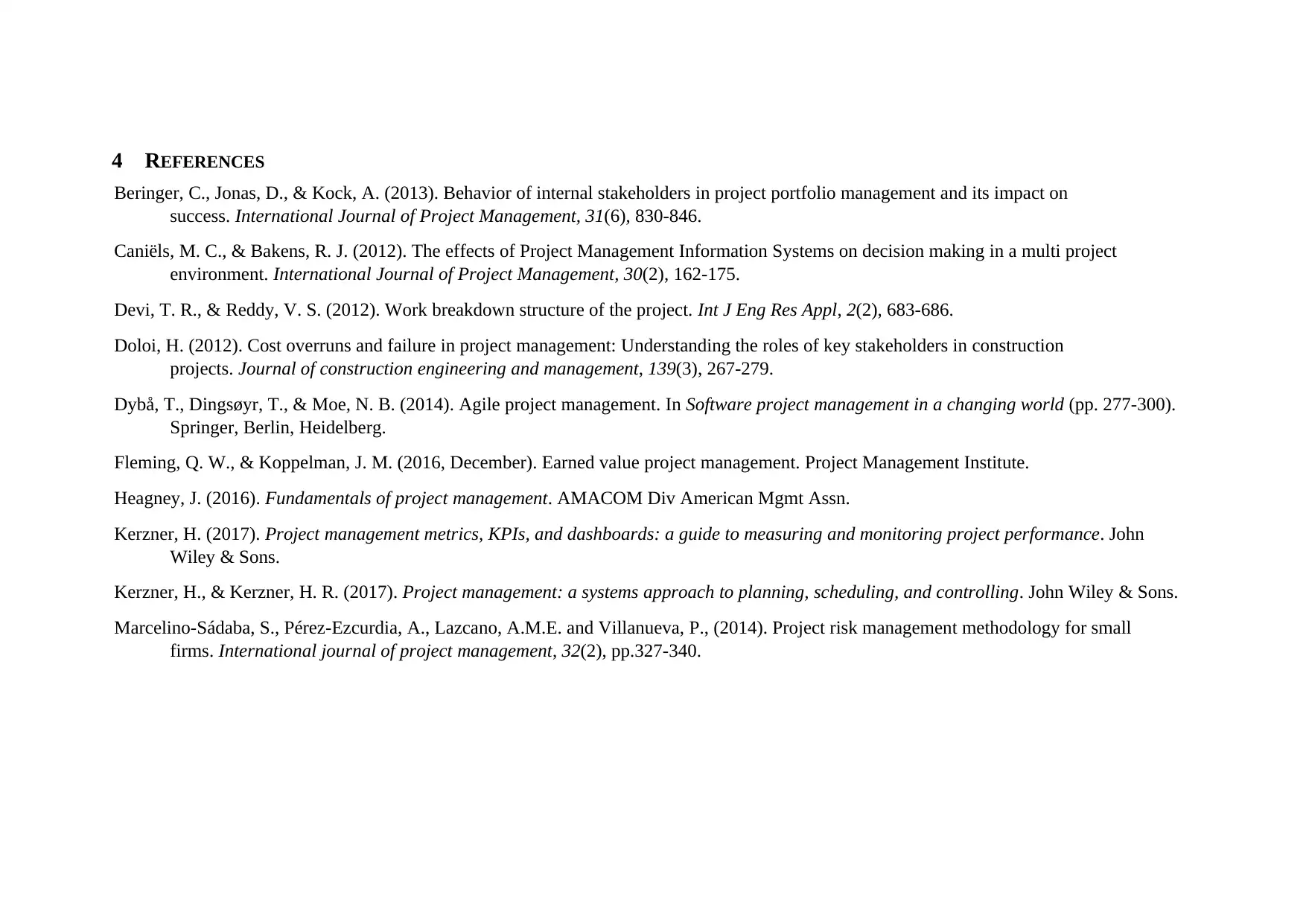
4 REFERENCES
Beringer, C., Jonas, D., & Kock, A. (2013). Behavior of internal stakeholders in project portfolio management and its impact on
success. International Journal of Project Management, 31(6), 830-846.
Caniëls, M. C., & Bakens, R. J. (2012). The effects of Project Management Information Systems on decision making in a multi project
environment. International Journal of Project Management, 30(2), 162-175.
Devi, T. R., & Reddy, V. S. (2012). Work breakdown structure of the project. Int J Eng Res Appl, 2(2), 683-686.
Doloi, H. (2012). Cost overruns and failure in project management: Understanding the roles of key stakeholders in construction
projects. Journal of construction engineering and management, 139(3), 267-279.
Dybå, T., Dingsøyr, T., & Moe, N. B. (2014). Agile project management. In Software project management in a changing world (pp. 277-300).
Springer, Berlin, Heidelberg.
Fleming, Q. W., & Koppelman, J. M. (2016, December). Earned value project management. Project Management Institute.
Heagney, J. (2016). Fundamentals of project management. AMACOM Div American Mgmt Assn.
Kerzner, H. (2017). Project management metrics, KPIs, and dashboards: a guide to measuring and monitoring project performance. John
Wiley & Sons.
Kerzner, H., & Kerzner, H. R. (2017). Project management: a systems approach to planning, scheduling, and controlling. John Wiley & Sons.
Marcelino-Sádaba, S., Pérez-Ezcurdia, A., Lazcano, A.M.E. and Villanueva, P., (2014). Project risk management methodology for small
firms. International journal of project management, 32(2), pp.327-340.
Beringer, C., Jonas, D., & Kock, A. (2013). Behavior of internal stakeholders in project portfolio management and its impact on
success. International Journal of Project Management, 31(6), 830-846.
Caniëls, M. C., & Bakens, R. J. (2012). The effects of Project Management Information Systems on decision making in a multi project
environment. International Journal of Project Management, 30(2), 162-175.
Devi, T. R., & Reddy, V. S. (2012). Work breakdown structure of the project. Int J Eng Res Appl, 2(2), 683-686.
Doloi, H. (2012). Cost overruns and failure in project management: Understanding the roles of key stakeholders in construction
projects. Journal of construction engineering and management, 139(3), 267-279.
Dybå, T., Dingsøyr, T., & Moe, N. B. (2014). Agile project management. In Software project management in a changing world (pp. 277-300).
Springer, Berlin, Heidelberg.
Fleming, Q. W., & Koppelman, J. M. (2016, December). Earned value project management. Project Management Institute.
Heagney, J. (2016). Fundamentals of project management. AMACOM Div American Mgmt Assn.
Kerzner, H. (2017). Project management metrics, KPIs, and dashboards: a guide to measuring and monitoring project performance. John
Wiley & Sons.
Kerzner, H., & Kerzner, H. R. (2017). Project management: a systems approach to planning, scheduling, and controlling. John Wiley & Sons.
Marcelino-Sádaba, S., Pérez-Ezcurdia, A., Lazcano, A.M.E. and Villanueva, P., (2014). Project risk management methodology for small
firms. International journal of project management, 32(2), pp.327-340.
⊘ This is a preview!⊘
Do you want full access?
Subscribe today to unlock all pages.

Trusted by 1+ million students worldwide
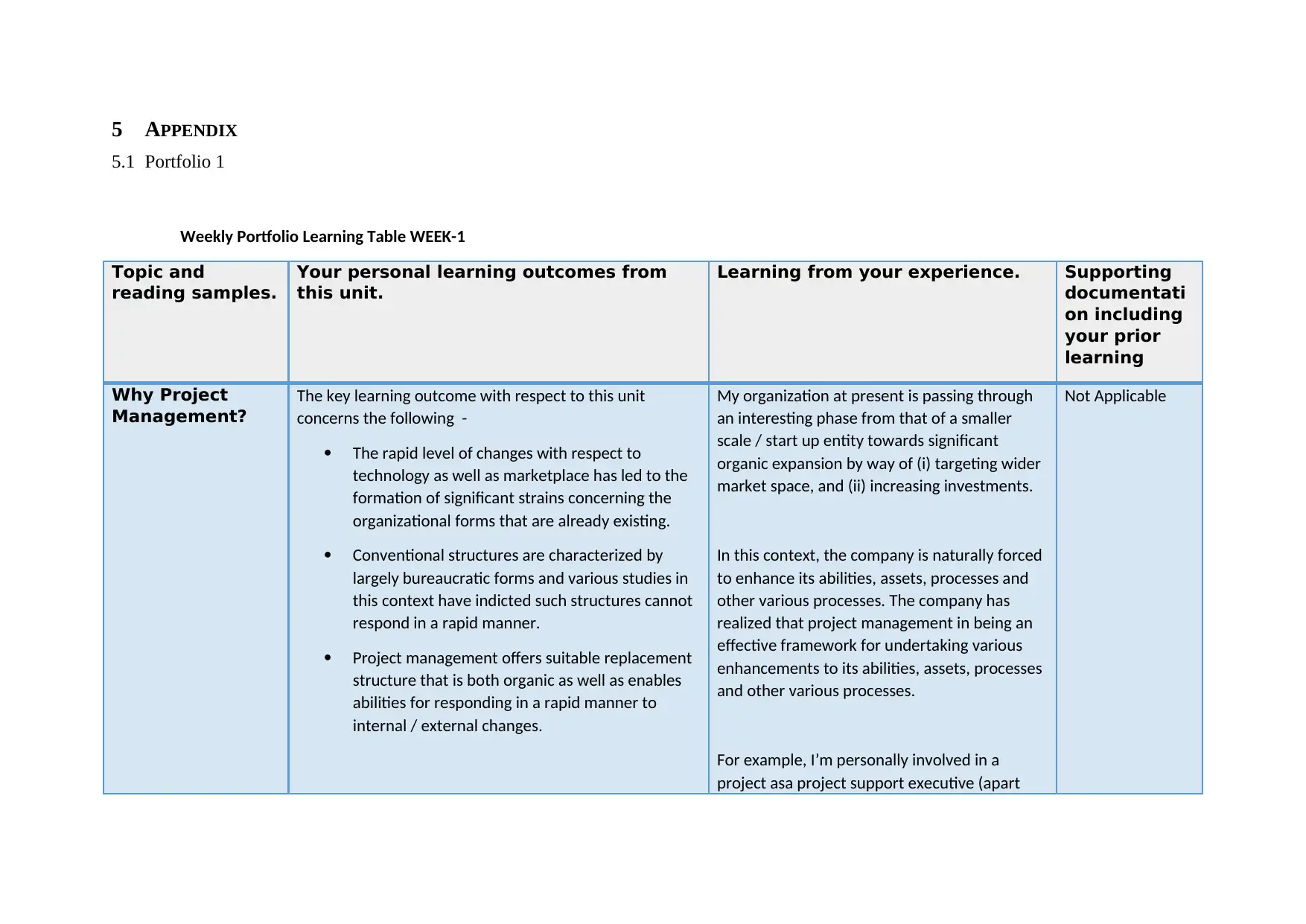
5 APPENDIX
5.1 Portfolio 1
Weekly Portfolio Learning Table WEEK-1
Topic and
reading samples.
Your personal learning outcomes from
this unit.
Learning from your experience. Supporting
documentati
on including
your prior
learning
Why Project
Management?
The key learning outcome with respect to this unit
concerns the following -
The rapid level of changes with respect to
technology as well as marketplace has led to the
formation of significant strains concerning the
organizational forms that are already existing.
Conventional structures are characterized by
largely bureaucratic forms and various studies in
this context have indicted such structures cannot
respond in a rapid manner.
Project management offers suitable replacement
structure that is both organic as well as enables
abilities for responding in a rapid manner to
internal / external changes.
My organization at present is passing through
an interesting phase from that of a smaller
scale / start up entity towards significant
organic expansion by way of (i) targeting wider
market space, and (ii) increasing investments.
In this context, the company is naturally forced
to enhance its abilities, assets, processes and
other various processes. The company has
realized that project management in being an
effective framework for undertaking various
enhancements to its abilities, assets, processes
and other various processes.
For example, I’m personally involved in a
project asa project support executive (apart
Not Applicable
5.1 Portfolio 1
Weekly Portfolio Learning Table WEEK-1
Topic and
reading samples.
Your personal learning outcomes from
this unit.
Learning from your experience. Supporting
documentati
on including
your prior
learning
Why Project
Management?
The key learning outcome with respect to this unit
concerns the following -
The rapid level of changes with respect to
technology as well as marketplace has led to the
formation of significant strains concerning the
organizational forms that are already existing.
Conventional structures are characterized by
largely bureaucratic forms and various studies in
this context have indicted such structures cannot
respond in a rapid manner.
Project management offers suitable replacement
structure that is both organic as well as enables
abilities for responding in a rapid manner to
internal / external changes.
My organization at present is passing through
an interesting phase from that of a smaller
scale / start up entity towards significant
organic expansion by way of (i) targeting wider
market space, and (ii) increasing investments.
In this context, the company is naturally forced
to enhance its abilities, assets, processes and
other various processes. The company has
realized that project management in being an
effective framework for undertaking various
enhancements to its abilities, assets, processes
and other various processes.
For example, I’m personally involved in a
project asa project support executive (apart
Not Applicable
Paraphrase This Document
Need a fresh take? Get an instant paraphrase of this document with our AI Paraphraser
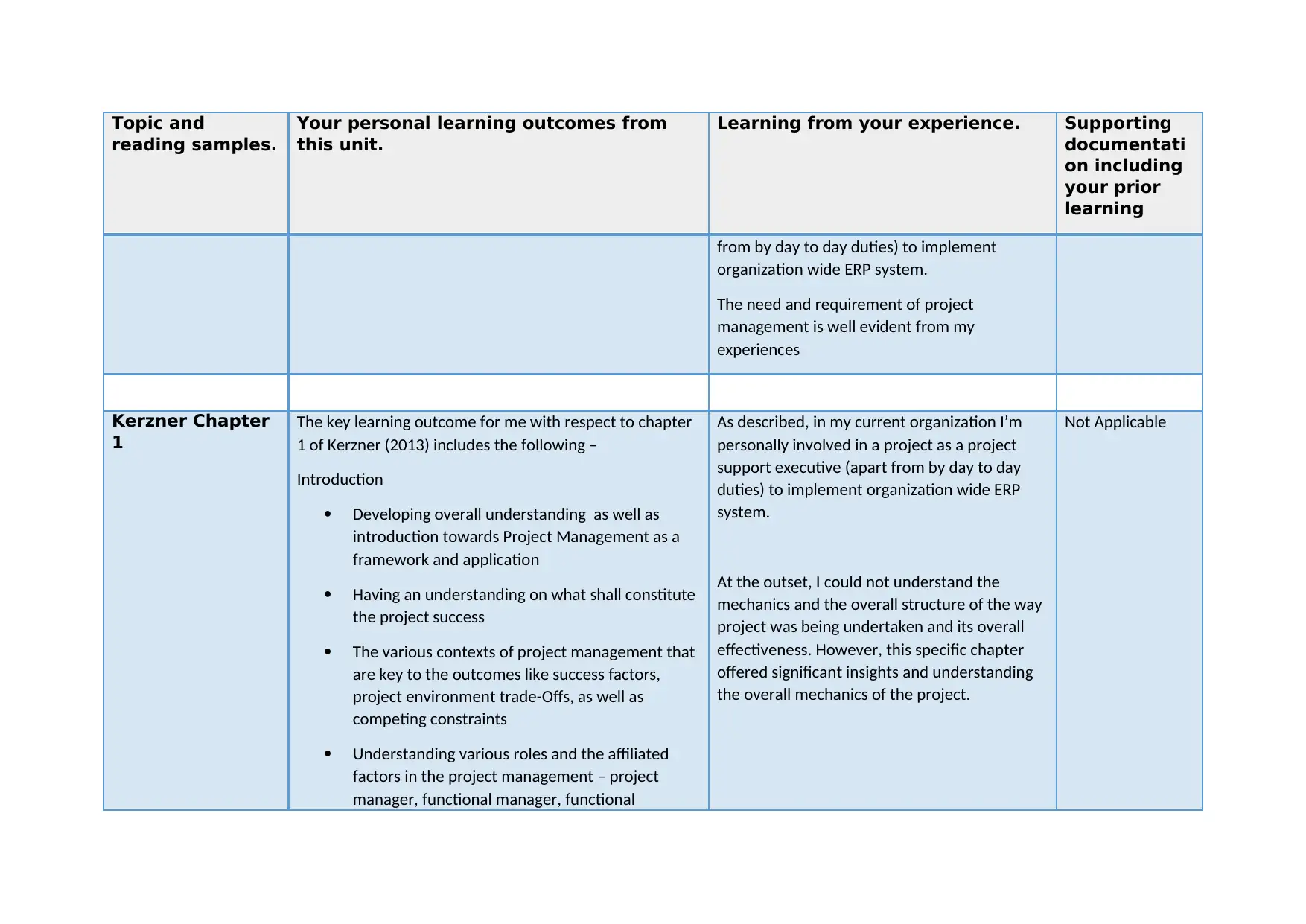
Topic and
reading samples.
Your personal learning outcomes from
this unit.
Learning from your experience. Supporting
documentati
on including
your prior
learning
from by day to day duties) to implement
organization wide ERP system.
The need and requirement of project
management is well evident from my
experiences
Kerzner Chapter
1
The key learning outcome for me with respect to chapter
1 of Kerzner (2013) includes the following –
Introduction
Developing overall understanding as well as
introduction towards Project Management as a
framework and application
Having an understanding on what shall constitute
the project success
The various contexts of project management that
are key to the outcomes like success factors,
project environment trade-Offs, as well as
competing constraints
Understanding various roles and the affiliated
factors in the project management – project
manager, functional manager, functional
As described, in my current organization I’m
personally involved in a project as a project
support executive (apart from by day to day
duties) to implement organization wide ERP
system.
At the outset, I could not understand the
mechanics and the overall structure of the way
project was being undertaken and its overall
effectiveness. However, this specific chapter
offered significant insights and understanding
the overall mechanics of the project.
Not Applicable
reading samples.
Your personal learning outcomes from
this unit.
Learning from your experience. Supporting
documentati
on including
your prior
learning
from by day to day duties) to implement
organization wide ERP system.
The need and requirement of project
management is well evident from my
experiences
Kerzner Chapter
1
The key learning outcome for me with respect to chapter
1 of Kerzner (2013) includes the following –
Introduction
Developing overall understanding as well as
introduction towards Project Management as a
framework and application
Having an understanding on what shall constitute
the project success
The various contexts of project management that
are key to the outcomes like success factors,
project environment trade-Offs, as well as
competing constraints
Understanding various roles and the affiliated
factors in the project management – project
manager, functional manager, functional
As described, in my current organization I’m
personally involved in a project as a project
support executive (apart from by day to day
duties) to implement organization wide ERP
system.
At the outset, I could not understand the
mechanics and the overall structure of the way
project was being undertaken and its overall
effectiveness. However, this specific chapter
offered significant insights and understanding
the overall mechanics of the project.
Not Applicable
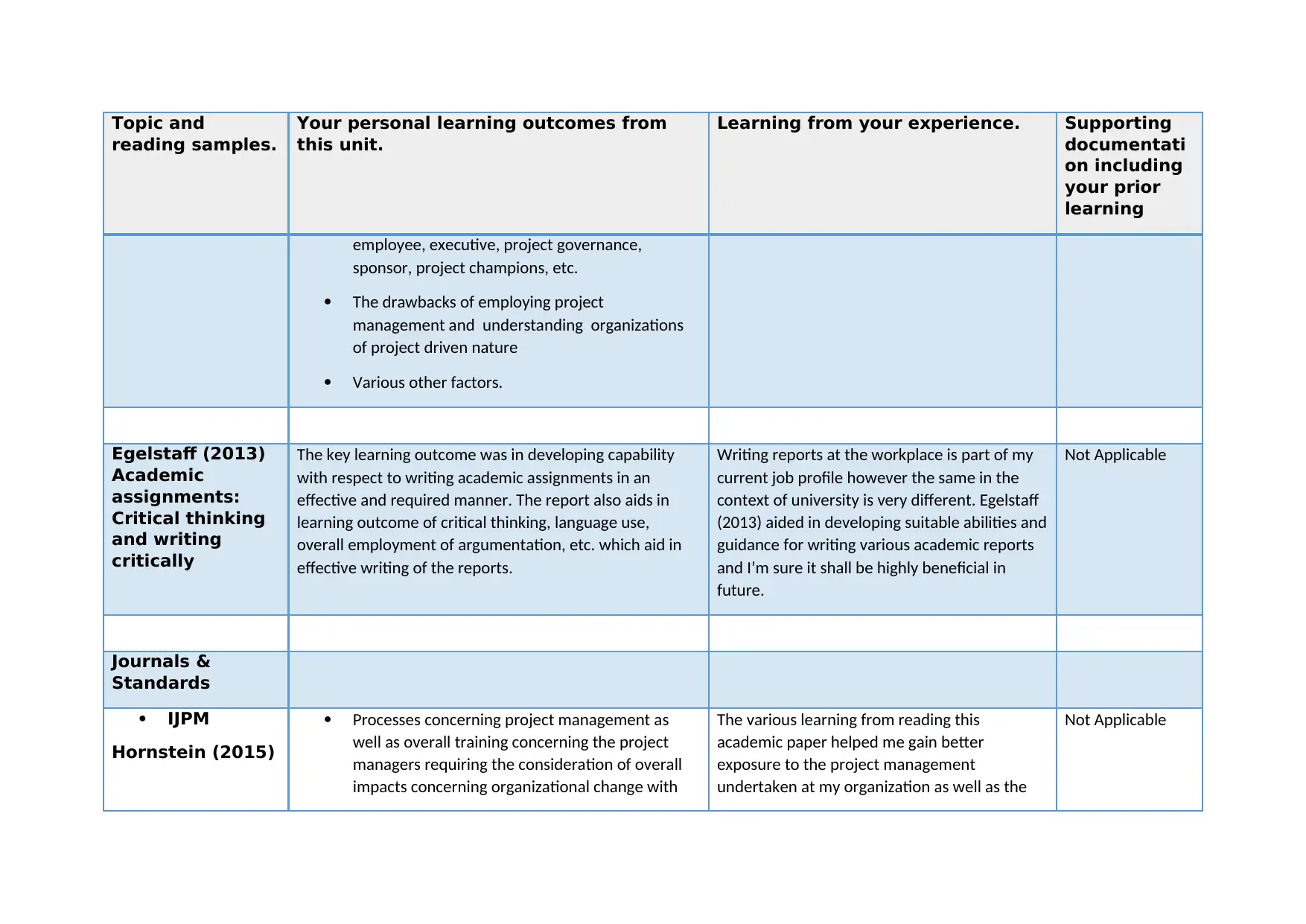
Topic and
reading samples.
Your personal learning outcomes from
this unit.
Learning from your experience. Supporting
documentati
on including
your prior
learning
employee, executive, project governance,
sponsor, project champions, etc.
The drawbacks of employing project
management and understanding organizations
of project driven nature
Various other factors.
Egelstaff (2013)
Academic
assignments:
Critical thinking
and writing
critically
The key learning outcome was in developing capability
with respect to writing academic assignments in an
effective and required manner. The report also aids in
learning outcome of critical thinking, language use,
overall employment of argumentation, etc. which aid in
effective writing of the reports.
Writing reports at the workplace is part of my
current job profile however the same in the
context of university is very different. Egelstaff
(2013) aided in developing suitable abilities and
guidance for writing various academic reports
and I’m sure it shall be highly beneficial in
future.
Not Applicable
Journals &
Standards
IJPM
Hornstein (2015)
Processes concerning project management as
well as overall training concerning the project
managers requiring the consideration of overall
impacts concerning organizational change with
The various learning from reading this
academic paper helped me gain better
exposure to the project management
undertaken at my organization as well as the
Not Applicable
reading samples.
Your personal learning outcomes from
this unit.
Learning from your experience. Supporting
documentati
on including
your prior
learning
employee, executive, project governance,
sponsor, project champions, etc.
The drawbacks of employing project
management and understanding organizations
of project driven nature
Various other factors.
Egelstaff (2013)
Academic
assignments:
Critical thinking
and writing
critically
The key learning outcome was in developing capability
with respect to writing academic assignments in an
effective and required manner. The report also aids in
learning outcome of critical thinking, language use,
overall employment of argumentation, etc. which aid in
effective writing of the reports.
Writing reports at the workplace is part of my
current job profile however the same in the
context of university is very different. Egelstaff
(2013) aided in developing suitable abilities and
guidance for writing various academic reports
and I’m sure it shall be highly beneficial in
future.
Not Applicable
Journals &
Standards
IJPM
Hornstein (2015)
Processes concerning project management as
well as overall training concerning the project
managers requiring the consideration of overall
impacts concerning organizational change with
The various learning from reading this
academic paper helped me gain better
exposure to the project management
undertaken at my organization as well as the
Not Applicable
⊘ This is a preview!⊘
Do you want full access?
Subscribe today to unlock all pages.

Trusted by 1+ million students worldwide
1 out of 83
Related Documents
Your All-in-One AI-Powered Toolkit for Academic Success.
+13062052269
info@desklib.com
Available 24*7 on WhatsApp / Email
![[object Object]](/_next/static/media/star-bottom.7253800d.svg)
Unlock your academic potential
Copyright © 2020–2026 A2Z Services. All Rights Reserved. Developed and managed by ZUCOL.

